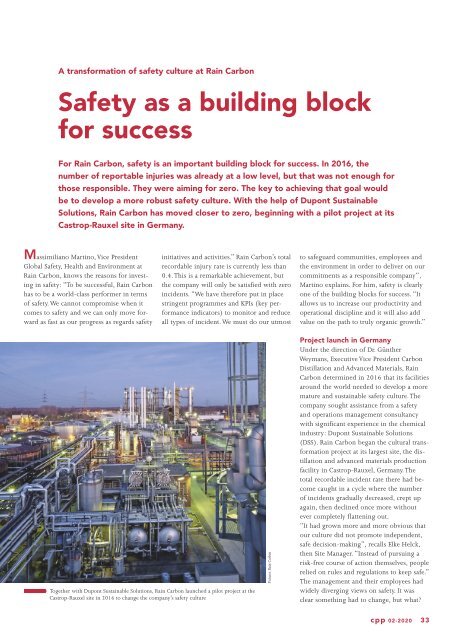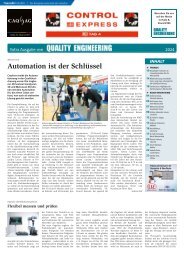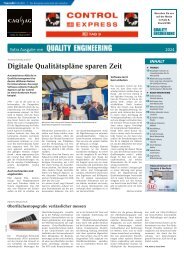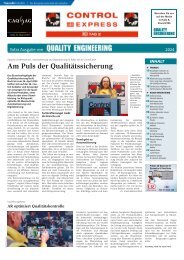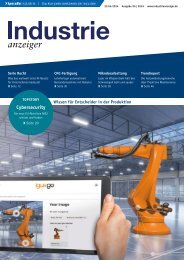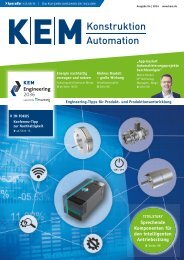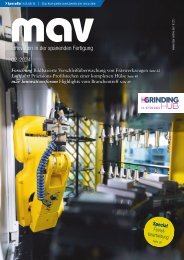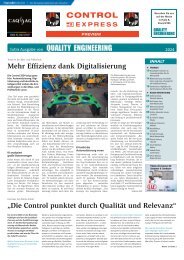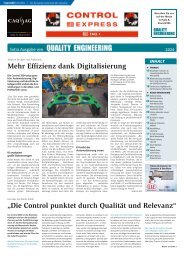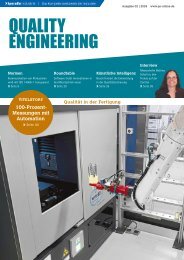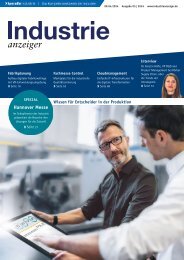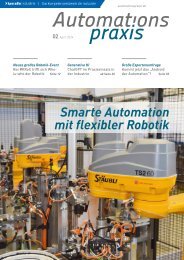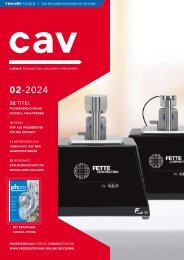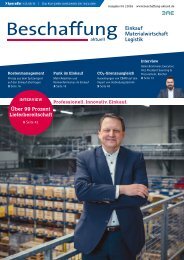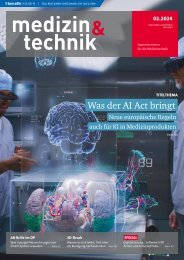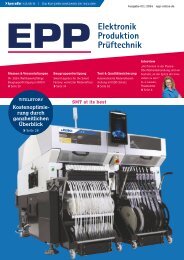cpp – Process technology for the chemical industry 02.2020
The journal cpp - Process technology for the chemical industry reports about processes, plants, apparatus and components for the chemical and pharmaceutical industry. Further topics are IT technologies, industry 4.0, digital production, MSR and automation technology and process analysis technology. The content spectrum is rounded off by explosion protection, plant safety, occupational health and safety, maintenance, site management and energy management.
The journal cpp - Process technology for the chemical industry reports about processes, plants, apparatus and components for the chemical and pharmaceutical industry. Further topics are IT technologies, industry 4.0, digital production, MSR and automation technology and process analysis technology. The content spectrum is rounded off by explosion protection, plant safety, occupational health and safety, maintenance, site management and energy management.
You also want an ePaper? Increase the reach of your titles
YUMPU automatically turns print PDFs into web optimized ePapers that Google loves.
A trans<strong>for</strong>mation of safety culture at Rain Carbon<br />
Safety as a building block<br />
<strong>for</strong> success<br />
For Rain Carbon, safety is an important building block <strong>for</strong> success. In 2016, <strong>the</strong><br />
number of reportable injuries was already at a low level, but that was not enough <strong>for</strong><br />
those responsible. They were aiming <strong>for</strong> zero. The key to achieving that goal would<br />
be to develop a more robust safety culture. With <strong>the</strong> help of Dupont Sustainable<br />
Solutions, Rain Carbon has moved closer to zero, beginning with a pilot project at its<br />
Castrop-Rauxel site in Germany.<br />
Massimiliano Martino, Vice President<br />
Glob al Safety, Health and Environment at<br />
Rain Carbon, knows <strong>the</strong> reasons <strong>for</strong> investing<br />
in safety: “To be successful, Rain Carbon<br />
has to be a world-class per<strong>for</strong>mer in terms<br />
of safety. We cannot compromise when it<br />
comes to safety and we can only move <strong>for</strong>ward<br />
as fast as our progress as regards safety<br />
initiatives and activities.” Rain Carbon’s total<br />
recordable injury rate is currently less than<br />
0.4. This is a remarkable achievement, but<br />
<strong>the</strong> company will only be satisfied with zero<br />
incidents. “We have <strong>the</strong>re<strong>for</strong>e put in place<br />
stringent programmes and KPIs (key per<strong>for</strong>mance<br />
indicators) to monitor and reduce<br />
all types of incident. We must do our utmost<br />
to safeguard communities, employees and<br />
<strong>the</strong> environment in order to deliver on our<br />
commitments as a responsible company”,<br />
Martino explains. For him, safety is clearly<br />
one of <strong>the</strong> building blocks <strong>for</strong> success. “It<br />
allows us to increase our productivity and<br />
operational discipline and it will also add<br />
value on <strong>the</strong> path to truly organic growth.”<br />
Toge<strong>the</strong>r with Dupont Sustainable Solutions, Rain Carbon launched a pilot project at <strong>the</strong><br />
Castrop-Rauxel site in 2016 to change <strong>the</strong> company’s safety culture<br />
Pictures: Rain Carbon<br />
Project launch in Germany<br />
Under <strong>the</strong> direction of Dr. Gün<strong>the</strong>r<br />
Weymans, Executive Vice President Carbon<br />
Distillation and Advanced Materials, Rain<br />
Carbon determined in 2016 that its facilities<br />
around <strong>the</strong> world needed to develop a more<br />
mature and sustainable safety culture. The<br />
company sought assistance from a safety<br />
and operations management consultancy<br />
with significant experience in <strong>the</strong> <strong>chemical</strong><br />
<strong>industry</strong>: Dupont Sustainable Solutions<br />
(DSS). Rain Carbon began <strong>the</strong> cultural trans<strong>for</strong>mation<br />
project at its largest site, <strong>the</strong> distillation<br />
and advanced materials production<br />
facility in Castrop-Rauxel, Germany. The<br />
total recordable incident rate <strong>the</strong>re had become<br />
caught in a cycle where <strong>the</strong> number<br />
of incidents gradually decreased, crept up<br />
again, <strong>the</strong>n declined once more without<br />
ever completely flattening out.<br />
“It had grown more and more obvious that<br />
our culture did not promote independent,<br />
safe decision-making”, recalls Elke Helck,<br />
<strong>the</strong>n Site Manager. “Instead of pursuing a<br />
risk-free course of action <strong>the</strong>mselves, people<br />
relied on rules and regulations to keep safe.”<br />
The management and <strong>the</strong>ir employees had<br />
widely diverging views on safety. It was<br />
clear something had to change, but what?<br />
<strong>cpp</strong> 02-2020 33


